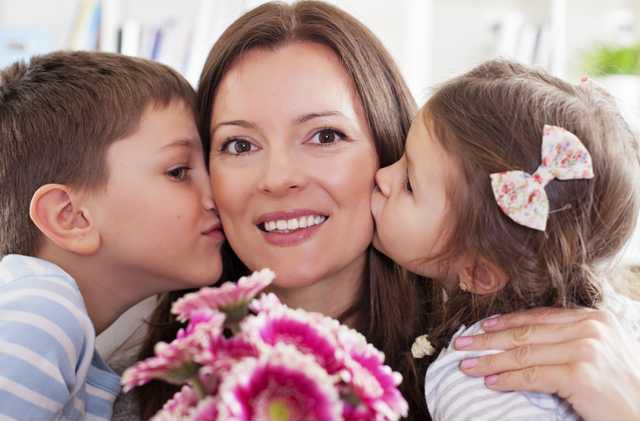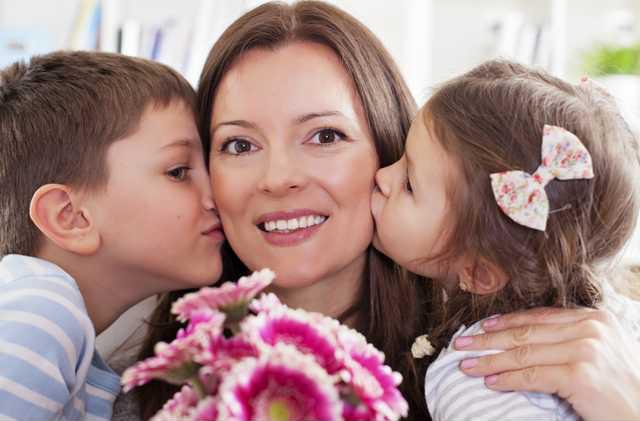Despite claims that women are having fewer children and that families sizes are shrinking, a study released Thursday found that women with higher education are choosing to have more children than in past decades, and that family size is maintaining.
The Pew Research Center used census data from the current population survey, specifically the data from a biannual survey asking women at the end of their child-bearing years about their fertility history, said Gretchen Livingston, senior researcher of the study.
"Lifetime fertility, that's the measure that I used here, is a really important measure, and it's one that tells a little bit of a different story than some of the other measures that are often reported about in the news, such as annual fertility rate," said Livingston.
According to the study, there have been significant drops in childlessness for highly educated women in the last two decades. Twenty-nine percent of women ages 40 to 44 with a master's degree were childless in 1994. But that's changed over the last decade, and the trend is now reversing. The percentage of childless women in this demographic dropped to 22 percent in 2014.
The gap between those with a medical degree or doctorate was even bigger where 35 percent of women at the end of child-bearing years were childless in 1994. Today, 20 percent of women with an medical degree or doctorate don't have children.
"Childlessness has actually declined in recent years, even though we've been hearing so much about annual fertility going down, the fact is that more women, near the end of their child-bearing years, are experiencing motherhood than what was the case even 10 years ago," Livingston said.
But how does this play into the balance women have to make with work and family? How and why do older women choose to have children, after possibly working and having a full-fledged career?
The choice to have more children comes as women are more confident in both their own abilities to balance work and family, and their husbands helping out at home, said Stephanie Coontz, Director of Research and Public Education on the Council on Contemporary Families.
"Men have just really increased their involvement in child care," Coontz said. "I think that that makes it more attractive to women to have children. There are a lot of myths that more educated women opt out as moms, but they are actually the least likely to opt out...these working women are much more likely to want to combine work and family."
This concept is part of a cultural shift that has taken place over the last 20 to 30 years. Just a few decades ago women would have felt like it was much harder to balance both work and family life; women today are feeling confident about a blend of both, Coontz said.
And for women with a higher education, there is usually more incentive to delay child-bearing in the pursuit of career goals, Coontz said.
On Thursday the Council on Contemporary Families released a study on housework, gender and parenting that looked at how having more supportive husbands is a factor in encouraging women to have more children, as well as to continue working.
Liana Sayer, one of the researchers, found that married fathers have doubled their developmental care of children and tripled their daily physical care since 1965. Married mothers have significantly reduced their housework hours, but they have increased their child care hours even more.
"Women whose husbands do more childcare are more willing to have a second child," Coontz said.
The study also looked at how women and men's combined paid and unpaid hours of work are now even, on average. When children are born, this balance is often thrown off, even if just for a time, and though that is expected, "sliding back into traditional gender roles can create marital dissatisfaction," Coontz said.
When women want to be in the workforce, as well as having children, it can being highly dissatisfying to be pulled away from their work, even with the best intentions of others, she said.
This is often where contention in the balance takes place, which is why an evenness of both unpaid and paid hours between husband and wife is a positive for many families.
The Pew study also found some correlation between education level and family size. Mothers with less education have more children, though the highest percentage of women in every education category are those with two children, the most popular choice.
This is something Coontz believes will continue to stabilize--there won't be major increase in family size for the majority, but people will continue to have children, even when they are working.
"If we want women to continue having children, having satisfying marriages and contributing to our economic productively, we need to make it easier for this balance to happen," Coontz said.
Twenty-six percent of mothers who are not high school graduates have four or more children, while only eight percent of mothers with postgraduate degrees have as many, according to the study.
The Pew Research Center used census data from the current population survey, specifically the data from a biannual survey asking women at the end of their child-bearing years about their fertility history, said Gretchen Livingston, senior researcher of the study.
"Lifetime fertility, that's the measure that I used here, is a really important measure, and it's one that tells a little bit of a different story than some of the other measures that are often reported about in the news, such as annual fertility rate," said Livingston.
According to the study, there have been significant drops in childlessness for highly educated women in the last two decades. Twenty-nine percent of women ages 40 to 44 with a master's degree were childless in 1994. But that's changed over the last decade, and the trend is now reversing. The percentage of childless women in this demographic dropped to 22 percent in 2014.
The gap between those with a medical degree or doctorate was even bigger where 35 percent of women at the end of child-bearing years were childless in 1994. Today, 20 percent of women with an medical degree or doctorate don't have children.
"Childlessness has actually declined in recent years, even though we've been hearing so much about annual fertility going down, the fact is that more women, near the end of their child-bearing years, are experiencing motherhood than what was the case even 10 years ago," Livingston said.
But how does this play into the balance women have to make with work and family? How and why do older women choose to have children, after possibly working and having a full-fledged career?
The choice to have more children comes as women are more confident in both their own abilities to balance work and family, and their husbands helping out at home, said Stephanie Coontz, Director of Research and Public Education on the Council on Contemporary Families.
"Men have just really increased their involvement in child care," Coontz said. "I think that that makes it more attractive to women to have children. There are a lot of myths that more educated women opt out as moms, but they are actually the least likely to opt out...these working women are much more likely to want to combine work and family."
This concept is part of a cultural shift that has taken place over the last 20 to 30 years. Just a few decades ago women would have felt like it was much harder to balance both work and family life; women today are feeling confident about a blend of both, Coontz said.
And for women with a higher education, there is usually more incentive to delay child-bearing in the pursuit of career goals, Coontz said.
On Thursday the Council on Contemporary Families released a study on housework, gender and parenting that looked at how having more supportive husbands is a factor in encouraging women to have more children, as well as to continue working.
Liana Sayer, one of the researchers, found that married fathers have doubled their developmental care of children and tripled their daily physical care since 1965. Married mothers have significantly reduced their housework hours, but they have increased their child care hours even more.
"Women whose husbands do more childcare are more willing to have a second child," Coontz said.
The study also looked at how women and men's combined paid and unpaid hours of work are now even, on average. When children are born, this balance is often thrown off, even if just for a time, and though that is expected, "sliding back into traditional gender roles can create marital dissatisfaction," Coontz said.
When women want to be in the workforce, as well as having children, it can being highly dissatisfying to be pulled away from their work, even with the best intentions of others, she said.
This is often where contention in the balance takes place, which is why an evenness of both unpaid and paid hours between husband and wife is a positive for many families.
The Pew study also found some correlation between education level and family size. Mothers with less education have more children, though the highest percentage of women in every education category are those with two children, the most popular choice.
This is something Coontz believes will continue to stabilize--there won't be major increase in family size for the majority, but people will continue to have children, even when they are working.
"If we want women to continue having children, having satisfying marriages and contributing to our economic productively, we need to make it easier for this balance to happen," Coontz said.
Twenty-six percent of mothers who are not high school graduates have four or more children, while only eight percent of mothers with postgraduate degrees have as many, according to the study.





